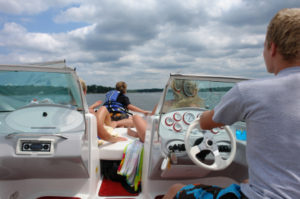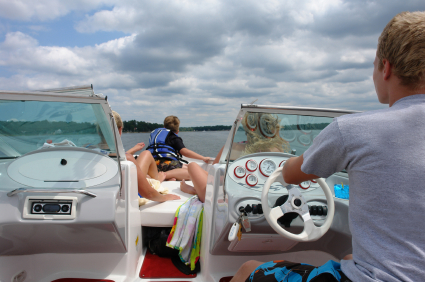The New Boating Under the Influence law amends Georgia Code § 52-7-12, which lowers the BAC from .10 to .08 for BUI, adds any glue, aerosol or other toxic vapor to the list of intoxicants, and includes accelerated and mandatory penalties for First Time and Repeat Offenders.
 View More Boating Law Articles & Videos
Georgia Senate Bill 136 was signed into law on April 23, 2013 and effective date of May 15, 2013. The cornerstone of the new Georgia Law was the Boating Under the Influence (BUI) reduction in the Blood Alcohol Concentration from .10 to .08. This reduction was designed to be more in-line with the Georgia automobile Driving Under the Influence standard. Further, First Time and Repeat Violators of the Boating Under the Influence law, after May 15, 2013, are subject to stiffer mandatory penalties that are similar to those that were put into effect in 2008 for automobile Driving Under the Influence violations.
The changes to the Georgia BUI Law were brought about after two child fatalities that were attributed to a vessel operator allegedly Boating Under the Influence. The new BUI Law Jake and Griffin Prince BUI Law was named in their honor. The intent of the new Georgia BUI Law is to have a lower threshold to take impaired operators of the water and punish them more severely.
The high profile penalty of tying a Boating Under the Influence boating license suspension to a person’s automobile driver’s license, although discussed, was not included in the final bill.

New Georgia law sets the blood-alcohol limit at .08 for boaters, the same for Georgia drivers on the road.
The signed law regarding BAC and intoxicants are basic changes; however, the amendments on punishments are lengthy and read as follows:
(m) Every person convicted of violating this Code section shall, upon a first or second conviction thereof, be guilty of a misdemeanor; upon a third conviction thereof, be guilty of a high and aggravated misdemeanor; and upon a fourth or subsequent conviction thereof, be guilty of a felony except as otherwise provided in paragraph (4) of this subsection and shall be punished as follows:
(1)Â For the first conviction with no conviction of and no plea of nolo contendere accepted to a charge of violating this Code section within the previous ten years, as measured from the dates of previous arrests for which convictions were obtained or pleas of nolo contendere were accepted to the date of the current arrest for which a conviction is obtained or a plea of nolo contendere is accepted:
(A)Â Â A fine of not less than $300.00 and not more than $1,000.00, which fine shall not, except as provided in subsection (n) of this Code section, be subject to suspension, stay, or probation;
A period of imprisonment of not fewer than ten days nor more than 12 months, which period of imprisonment may, at the sole discretion of the judge, be suspended,
stayed, or probated, except that if the offender’s alcohol concentration at the time of the offense was 0.08 grams or more, the judge may suspend, stay, or probate all but 24 hours of any term of imprisonment imposed under this subparagraph;
(B)Â Â Not fewer than 40 hours of community service, except that for a conviction for violationofsubsection(k)ofthisCodesectionwheretheperson‘s alcohol concentration at the time of the offense was less than 0.08 grams, the period of community service shall be not fewer than 20 hours;
(C)Â Â Completion of a DUI Alcohol or Drug Use Risk Reduction Program as defined in Code Section 40-5-1. The sponsor of any such program shall provide written notice of the Department of Drivers Service’s approval of the program to the person upon enrollment in the program;
(D)Â A clinical evaluation as defined in Code Section 40-5-1 and, if recommended as a part of such evaluation, completion of a substance abuse treatment program as defined in Code Section 40-5-1; provided, however, that in the court’s discretion, such evaluation may be waived; and
(E)Â Â If the person is sentenced to a period of imprisonment for fewer than 12 months, a period of probation of 12 months less any days during which the person is actually incarcerated;
(2)Â For the second conviction within a ten-year period of time, as measured from the dates of previous arrests for which convictions were obtained or pleas of nolo contendere were accepted to the date of the current arrest for which a conviction is obtained or a plea of nolo contendere is accepted:
(A)Â Â A fine of not less than $600.00 and not more than $1,000.00, which fine shall not, except as provided in subsection (n) of this Code section, be subject to suspension, stay, or probation;
(B)Â Â A period of imprisonment of not fewer than 90 days and not more than 12 months. The judge shall probate at least a portion of such term of imprisonment, in accordance with subparagraph (F) of this paragraph, and to such other terms and conditions as the judge may impose; provided, however, that the offender shall be required to serve not fewer than 72 hours of actual incarceration;
(C)Â Â Not fewer than 30 days of community service;Â Completion of a DUI Alcohol or Drug Use Risk Reduction Program as defined in Code Section 40-5-1. The sponsor of any such program shall provide written notice of the Department of Drivers Service’s approval of the program to the person upon enrollment in the program;
(E)A clinical evaluation as defined in Code Section 40-5-1 and, if recommended as a part of such evaluation, completion of a substance abuse treatment program as defined in Code Section 40-5-1; and
(F)A period of probation of 12 months less any days during which the person is actually incarcerated;
(3)Â For the third conviction within a ten-year period of time, as measured from the dates of previous arrests for which convictions were obtained or pleas of nolo contendere were accepted to the date of the current arrest for which a conviction is obtained or a plea of nolo contendere is accepted:
(A)Â Â A fine of not less than $1,000.00 and not more than $5,000.00, which fine shall not, except as provided in subsection (n) of this Code section, be subject to suspension, stay, or probation;
(B)Â Â A mandatory period of imprisonment of not fewer than 120 days and not more than 12 months. The judge shall probate at least a portion of such term of imprisonment, in accordance with subparagraph (F) of this paragraph, and to such other terms and conditions as the judge may impose; provided, however, that the offender shall be required to serve not fewer than 15 days of actual incarceration;
(C)Â Â Not fewer than 30 days of community service;
(D)Â Â Completion of a DUI Alcohol or Drug Use Risk Reduction Program as defined in Code Section 40-5-1. The sponsor of any such program shall provide written notice of the Department of Drivers Service’s approval of the program to the person upon enrollment in the program;
(E)Â Â A clinical evaluation as defined in Code Section 40-5-1 and, if recommended as a part of such evaluation, completion of a substance abuse treatment program as defined in Code Section 40-5-1; and
(F)Â Â A period of probation of 12 months less any days during which the person is actually incarcerated;
(4)Â For the fourth or subsequent conviction within a ten-year period of time, as measured from the dates of previous arrests for which convictions were obtained or pleas of nolo contendere were accepted to the date of the current arrest for which a conviction is obtained or a plea of nolo contendere is accepted:
(A)Â Â A fine of not less than $1,000.00 and not more than $5,000.00, which fine shall not, except as provided in subsection (n) of this Code section, be subject to suspension, stay, or probation;
(B)  A period of imprisonment of not less than one year and not more than five years; provided, however, that the judge may suspend, stay, or probate all but 90 days of any term of imprisonment imposed under this paragraph. The judge shall probate at least a portion of such term of imprisonment, in accordance with subparagraph (F) of this paragraph, and to such other terms and conditions as the judge may impose;
(C)Â Â Not fewer than 60 days of community service; provided, however, that if a defendant is sentenced to serve three years of actual imprisonment, the judge may suspend the community service;
(D)Â Â Completion of a DUI Alcohol or Drug Use Risk Reduction Program as defined in Code Section 40-5-1. The sponsor of any such program shall provide written notice of the Department of Driver Service’s approval of the program to the person upon enrollment in the program;
(E)Â Â A clinical evaluation as defined in Code Section 40-5-1 and, if recommended as a part of such evaluation, completion of a substance abuse treatment program as defined in Code Section 40-5-1; and
(F)Â Â A period of probation of five years less any days during which the person is actually imprisoned;Â provided, however, that if the ten-year period of time as measured in this paragraph commenced prior to May 15, 2013, then such fourth or subsequent conviction shall be a misdemeanor of a high and aggravated nature and punished as provided in paragraph (3) of this subsection;
(5)Â For the purpose of imposing a sentence under this subsection, a plea of nolo contendere based on a violation of this Code section shall constitute a conviction; and (6)Â Â For purposes of determining the number of prior convictions or pleas of nolo contendere pursuant to the felony provisions of paragraph (4) of this subsection, only those offenses for which a conviction is obtained or a plea of nolo contendere is accepted on or after May 15, 2013, shall be considered; provided, however, that nothing in this subsection shall be construed as limiting or modifying in any way sentence enhancement provisions under Georgia law, including, but not limited to, provisions relating to punishment of recidivist offenders pursuant to Title 17.
(n)(1) If the payment of the fine required under subsection (m) of this Code section will impose an economic hardship on the defendant, the judge, at his or her sole discretion, may order the defendant to pay such fine in installments, and such order may be enforced through a contempt proceeding or a revocation of any probation otherwise authorized by this Code section.
(2)Inthesolediscretionofthejudge,heorshemay suspend up to one-half of the fine imposed under subsection (m) of this Code section conditioned upon the defendant’s undergoing treatment in a substance abuse treatment program as defined in Code Section 40-5-1.
(o) As used in this Code section, the term ‘personal watercraft’ shall have the same meaning as set forth in Code Section 52-7-8.2.”
According to the DNR, in 2012, Rangers made 180 BUI arrests statewide, with Lake Lanier accounting for 60 of those cases. The new Georgia 2013 Boating Under the Influence Law will hopefully encourage people to not operate a boat while under the influence of drugs or alcohol, or risk potential serious charges and fines like those associated with a Georgia DUI, or worse the potential injury or death of another person.
At A. Bishop Law, our Georgia boat injury lawyers welcome any questions about boating safety and boating law.  If you, a family member, or friend has been arrested due to a Boating Under the Influence charge, please Call or Email us about any questions you may have.  Your initial consultation is free and confidential.
About the attorney:  Anne Bishop is a Georgia Lawyer with A. Bishop Law in Gainesville, Georgia and handles various DUI / DWI, Marijuana Arrests and other Georgia Criminal Defense matters.  The law office of A. Bishop Law can assist clients throughout Georgia including: Hall County (Gainesville, Oakwood, Flowery Branch), Jackson County  (Jefferson, Braselton) White County (Helen, Cleveland), Lumpkin County (Dahlonega), Dawson County (Dawsonville), Habersham County (Demorest, Cornelia), and all of Northeast Georgia.
This article and/or video should not be considered nor relied upon as legal advice since it is only intended for general overview and informational purposes. Please consult with an attorney on your specific situation in order to determine an appropriate legal course of action.





Pingback: New Georgia Boating Laws - Cushing Park | Cushing Park